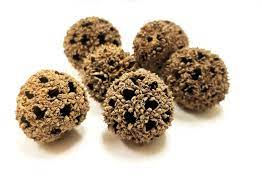Lu Lu Tong (Fructus Liquidambaris) is an herb commonly used in traditional Chinese medicine. It is the fruit of the Liquidambar tree, which is native to eastern and southeastern Asia. Lu Lu Tong is believed to have a variety of therapeutic effects, including anti-inflammatory, analgesic, and diuretic properties.
In traditional Chinese medicine, Lu Lu Tong is commonly used to treat conditions such as arthritis, back pain, and urinary tract infections. It is also believed to have a warming and invigorating effect on the body, and may be beneficial for improving circulation and promoting overall health.
Benefits:
Anti-inflammatory effects: Lu Lu Tong is believed to have anti-inflammatory properties that can help to reduce inflammation in the body. The herb may be beneficial for treating conditions such as arthritis, back pain, and other inflammatory disorders.
Pain relief: Lu Lu Tong is often used in TCM to relieve pain and stiffness in the joints and muscles. The herb is believed to have analgesic effects that can help to alleviate pain and improve mobility.
Diuretic effects: Lu Lu Tong is also used in TCM as a diuretic, which can help to increase urine production and promote the excretion of excess fluids and waste products from the body. This can be beneficial for conditions such as edema (swelling) and urinary tract infections.
Contradictions:
Taiwan maple fruit may cause stomach upset, including nausea, vomiting, and diarrhea, when taken orally.
Taiwan maple fruit may interact with certain medications, including blood thinners, and should not be used by people taking these medications without first consulting a healthcare provider.
Taiwan maple fruit may cause allergic reactions in some people when taken orally or applied topically.
Taiwan maple fruit may lower blood sugar levels and should be used with caution in people with hypoglycemia or diabetes.
Taiwan maple fruit may cause hormonal imbalances and should be used with caution in people with hormone-sensitive conditions, such as breast cancer or endometriosis.
Tastes Like:
Lu Lu Tong (Fructus Liquidambaris) has a slightly bitter taste, and in traditional Chinese medicine, the bitter taste of the herb is believed to have a cooling and drying effect on the body. The herb is also believed to have a warming effect, which can help to improve circulation and promote overall health.
Preparation:
Lu Lu Tong is typically consumed as a decoction or tea. To prepare the herb, the dried fruit is simmered in water for an extended period of time to extract the active compounds. The resulting liquid can be consumed warm or at room temperature, and may be quite bitter in taste. Some people may find the taste of Lu Lu Tong to be somewhat unpleasant, and may prefer to add honey or other natural sweeteners to improve the taste.


